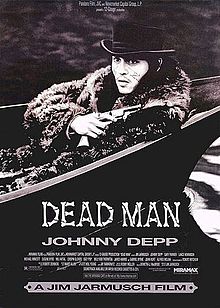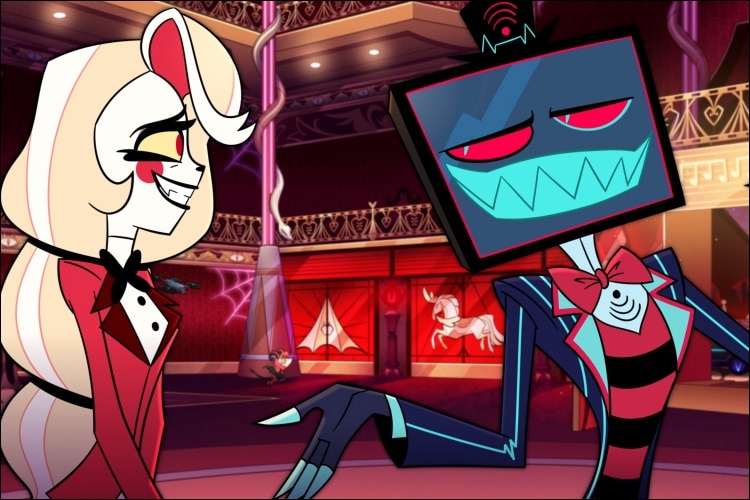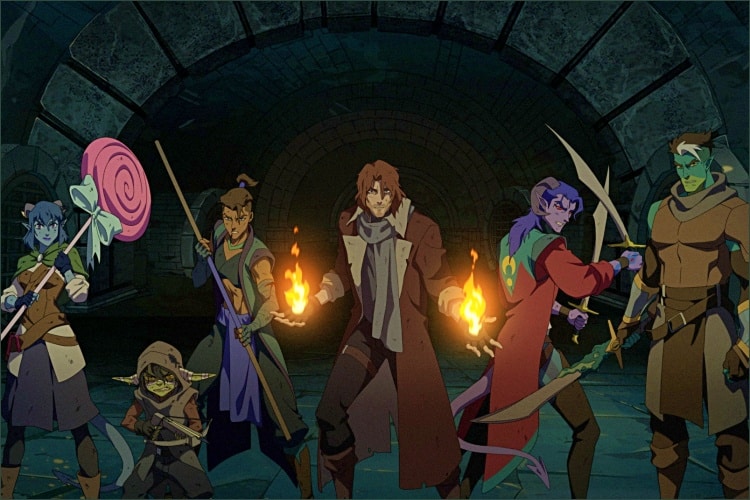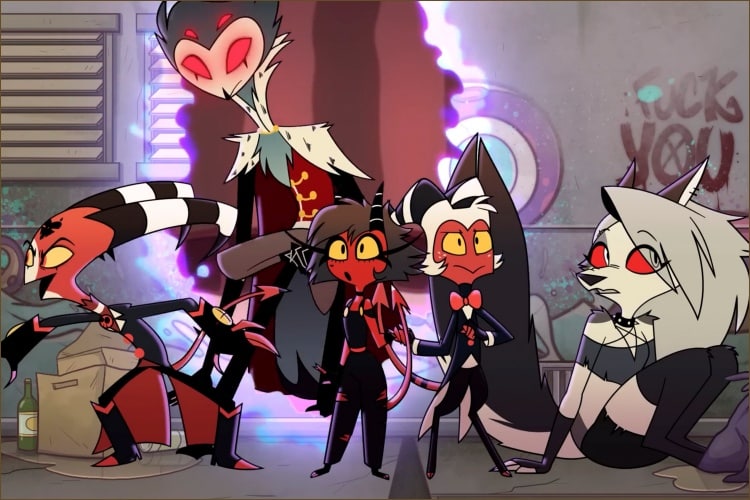The frontier is no place for an accountant
Main Cast: Johnny Depp, Gary Farmer
Director: Jim Jarmusch
In the late 1800’s, if you were smart, you stayed east of the Mississippi. The west was a place for those seeking fortune who had nothing to lose. It most definitely was not a place for accountants from Cleveland. Too bad nobody thought to pass on that bit of information to one William Blake before he set out for the frontier in the 1995 release Dead Man.
Bill Blake (Johnny Depp) is indeed an accountant from Cleveland. He’s traveling by train across the country to take a position at the Dickerson Machineworks in a town called, of course, Machine. He has a letter confirming his employment. The film opens with his long journey west. Blake sits, in his spiffy plaid suit, and watches as the occupants of his train go from nice family groups to filthy, scruffy, fur-wearing frontiersmen. He grows increasingly uncomfortable, as well he should, since his journey culminates in the Train Fireman telling him that his journey will lead him to his grave. Not an auspicious beginning to Blake’s new life in Machine.
Things don’t better as Blake is told (by a wonderfully greasy John Hurt) that his position has been filled. Upon being told by Dickerson himself (Robert Mitchum) – emphatically and at gunpoint – that his services are neither needed nor wanted, Blake leaves the factory. Unfortunately, he has spent his last dollar getting to Machine, a place where the word “disgusting” would be a complimentary descriptor. After buying himself some solace booze, he is rather rudely introduced to Thel Russell (Mili Avital) as she’s thrown out on the street by one of the cultured citizens of Machine. She takes him to her room, only to have their tryst interrupted by former boyfriend Charlie (Gabriel Byrne), who is as ridiculously violent as he is heartfeltly repentant over causing Thel any undue pain and suffering. The encounter ends with two people dead and Blake unceremoniously tossing himself out a window in his skivvies and fleeing on (stolen) horseback. Now Blake is wounded, on the run, penniless and clueless. A really bad combination. Turns out Charlie was Dickerson’s son. Turns out Dickerson wants his horse back. Preferably along with the dead body of Blake.
Blake doesn’t really know the extent of his troubles. He wakes to find himself being rather harshly tended to by a man named Nobody (Gary Farmer). Nobody is a solitary native, schooled in England, shunned by his own people, convinced that he has stumbled upon William Blake the (dead) English poet, despite how tremendously unlikely that would be. Blake and Nobody set off on a journey to nowhere, for that is where Blake was headed all along.
Writer/director Jim Jarmusch hands out nothing in Dead Man. No easy morals smacking us in the face, no clear story goal, no excess dialogue to explain things. Even the sparse dialogue he does give us makes little sense most of the time. He doesn’t even make the film easy to watch or listen to. He wants us to work for this one, something worth doing if you’re in the mood.
The single most prevalent occurrence in the film is the constant falling asleep and waking up of our main character. Blake is constantly passing out and waking to some new scenario. Unlike a more traditional “reawakening”, there is no new day, new optimism, new opportunity that comes with each awakening. For the most part, Blake awakens to a world where his situation has worsened, or at the very least become significantly weirder (and in this movie, that is saying something, indeed). Our groggy protagonist goes from pretty Easterner in a plaid suit to filthy murderer in a fur coat, all between unscheduled naps. This device, while it sounds strange, works quite nicely in the overall film. As Blake’s world becomes increasingly surreal, and as he weakens physically and changes morally, ethically, intrinsically, we also see him become less afraid, more accepting of this world where not all goes according to plan. With each awakening, he does have something of a new day, a day where he can play the hand he’s been dealt, and see this journey through to its inevitable conclusion.
Blake has his spiritual guide in Nobody, and he has his demons as well. Those demons will give chase, and he will either vanquish or be vanquished by them. Dickerson hires three noted killers to bring Blake down in the form of Cole Wilson (Lance Henrikson), Conway Twill (Michael Wincott) and Johnny “The Kid” Pickett (Eugene Byrd). The bounty hunters are a mixed bag of the immature (Pickett), the verbal diarrheic (Twill) and the psychotic (Wilson). The three provide a considerable amount of the films very dark humor. Each is used to working alone, and it is more than fair to say that none of them plays well with others. These main demons are joined by other, peripheral demons. Iggy Pop, Billy Bob Thornton and Jared Harris form a trio of the most far-fetched bible (sort of) quoting, cross dressing, interloper devouring frontiersman you ever will meet. Again, their brief appearance, while not at all pretty, does provide some dark and strange humor. Interwoven with a heaping helping of violence and beans. It seems that a lot of Blake’s demons are dipshits – but out of control enough dipshits to be extremely dangerous. For the most part, Blake is unaware of those who seek to destroy him, though he is aware that he is a much-wanted man. He goes from being indignant at the injustice of being wrongfully accused to accepting his new status and dealing with those who may intend him harm. Quite efficiently for someone so sleepy.
Blake’s relationship with Nobody is never really quite clear. Nor is it meant to be. We know little about Nobody, really, or why he is helping Blake on this journey. We only know that he is confident in his path, and knows that he can guide the way for Blake. While Blake isn’t always so sure of this fact, he is often physically unable to argue. He also has no other options. He comes to appreciate Nobody, despite the fact that he understands very little of what the man tells him. He adopts the persona necessary to cope with his situation and his journey – something he could not have done without the guidance of Nobody.
Depp plays his role as the desperate and out of place Blake with great style and disarming intensity. He makes the transition from prissy accountant to wild frontiersman without a hitch, always with subtlety and stoicism. Gary Farmer stands out as Nobody – spouting his rambling dialogue without faltering, and managing to give his character a kind of unspoken wisdom about this situation that he never outright shares. He’s funny and endearing, as well as vague and frustrating. Lance Henrikson pulls off a bad guy performance equal to his craggy appearance. He says very little, but plays out his characters actions with a sort of robotic pragmatism that makes Cole creepy and foul. The rest of the supporting cast also turn in excellent performances, managing to pull off their strange roles quite successfully. Iggy Pop, in particular, as well as Billy Bob Thornton, deserve special mention in the really-weird-but-really-well-done category.
There are two things that seriously hurt this film. The score and the cinematography. Neil Young provides the often discordant, jangling chords that accompany the movie. This rather jarring music is not, in and of itself, the problem. It fits the tone of the movie rather well. The problem is that it is overwhelmingly loud. At times to the point of drowning out dialogue, something which the film doesn’t have in abundance in the first place. While I never like a score that overwhelms the film, this is simply ear bleedingly unpleasant. The film is shot (by Robby Muller) in black and white. The initial scenes in the train are crisp and clear. Once Blake gets to Machine, and the story actually begins, the pictures go from sharp and clear to either washed out and overly light or muddy and overly dark. While this certainly does illustrate the deterioration of our protagonist, as well as the bleak nature of his surroundings, it’s just too much. There are times when it is a distinct struggle to see what’s happening on the screen. Intentional or not (and I’m guessing intentional), this smacks of style over substance, and an inherent disregard for the audience. Working to dig out themes and meaning is one thing, squinting at the screen and covering your ears is something else. The music and photography are sufficiently grating to knock a star off the overall rating of the film.
Taken as a whole, Dead Man is a somewhat unpleasant experience that somehow manages to be quite a good film. Depp is, as always, a pleasure to watch, and his journey is one filled with meaning. What that meaning is intended to be, who knows, but any viewer with patience can find plenty to work with. Jarmusch makes major blunders with both the cinematography and the score, blunting the overall effect of the film, yet there is still much value in watching William Blake and Nobody take this journey. 3 1/2 stars out of 5.

Sue reads a lot, writes a lot, edits a lot, and loves a good craft. She was deemed “too picky” to proofread her children’s school papers and wears this as a badge of honor. She is also proud of her aggressively average knitting skills. TV and indie movies are her jam.







Leave a Reply